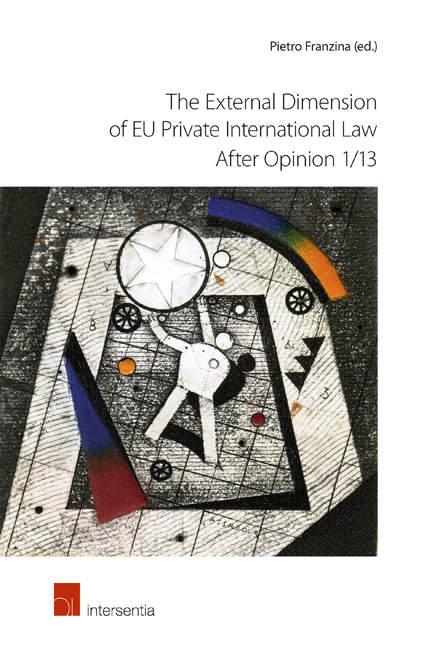Book contents
- Frontmatter
- Preface
- Contents
- PART I THE INTERNATIONAL PROJECTION OF EU PRIVATE INTERNATIONAL LAW - SOME BASIC ISSUES
- Opinions 1/13 and 2/13 and EU External Relations Law
- Between Mutual Trust and Respect for Fundamental Rights - Judicial Cooperation in Civil Matters and the European Convention on Human Rights After Opinion 2/13
- PART II OPINION 1/13 AND ITS IMPLICATIONS
- PART III THE CHANGING FEATURES OF EU EXTERNAL RELATIONS IN THE AREA OF PRIVATE INTERNATIONAL LAW
- PART IV EU LEGISLATION ON PRIVATE INTERNATIONAL LAW AND EXTRA-EUROPEAN SITUATIONS
Between Mutual Trust and Respect for Fundamental Rights - Judicial Cooperation in Civil Matters and the European Convention on Human Rights After Opinion 2/13
from PART I - THE INTERNATIONAL PROJECTION OF EU PRIVATE INTERNATIONAL LAW - SOME BASIC ISSUES
Published online by Cambridge University Press: 15 December 2017
- Frontmatter
- Preface
- Contents
- PART I THE INTERNATIONAL PROJECTION OF EU PRIVATE INTERNATIONAL LAW - SOME BASIC ISSUES
- Opinions 1/13 and 2/13 and EU External Relations Law
- Between Mutual Trust and Respect for Fundamental Rights - Judicial Cooperation in Civil Matters and the European Convention on Human Rights After Opinion 2/13
- PART II OPINION 1/13 AND ITS IMPLICATIONS
- PART III THE CHANGING FEATURES OF EU EXTERNAL RELATIONS IN THE AREA OF PRIVATE INTERNATIONAL LAW
- PART IV EU LEGISLATION ON PRIVATE INTERNATIONAL LAW AND EXTRA-EUROPEAN SITUATIONS
Summary
INTRODUCTION
This chapter discusses the relationship between the EU legal order and a rather peculiar component of its ‘external dimension’, namely its relationship to the European Convention on Human Rights and Fundamental Freedoms (ECHR).
The possible impact of the Court of Justice's Opinion 2/13 on this relationship will be addressed mainly from the perspective of the ECHR and of the European Court of Human Rights (ECtHR), rather than that of the EU. Moreover, the focus will be specifically on the ECHR's influence on EU judicial cooperation in civil matters and, more specifically, on issues of private international law.
At first glance, it may seem that the Opinion issued on 18 December 2014 has no impact at all on this relationship. Differently from what might be expected, the Court of Justice concluded that the accession agreement
is not compatible with Article 6(2) TEU or with Protocol (No 8) relating to Article 6(2) of the Treaty on European Union.
The existence of an express legal basis for accession, enshrined in Article 6(2) TEU, the involvement of the Court of Justice in the negotiation process and the (essentially positive) views of AG Kokott suggested that at a different outcome could be possible. Yet the difficulty for the Court of Justice to accept the direct supervision of the European Court of Human Rights has been apparent ever since Opinion 2/94. The conditions for accession set out in the Treaties, notably in Protocol no. 8 TEU and in the Declaration on Article 6(2), paved the way for the rigid approach to the issue adopted by the Court of Justice in its last opinion. 6 At least for the time being, therefore, the autonomy of the EU legal order, which was one of the main preoccupations of the ECJ in the negotiation phase, has been ‘preserved’: the European Convention will continue to bind the EU only under EU law, and there will be no direct external control over acts of EU Institutions, including the Court of Justice itself, by the European Court of Human Rights.
- Type
- Chapter
- Information
- Publisher: IntersentiaPrint publication year: 2016



